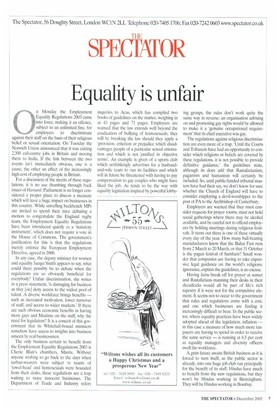SPECTATOR Equality is unfair
on Monday the Employment Equality Regulations 2003 came into force, making it an offence, subject to an unlimited fine, for employers to discriminate against their staff on the basis of their religious belief or sexual orientation. On Tuesday the Norwich Union announced that it was cutting 2,300 call-centre jobs in Britain and moving them to India. If the link between the two events isn't immediately obvious, one is a cause, the other an effect of the increasingly high cost of employing people in Britain.
For a discussion of the merits of these regulations, it is no use thumbing through back issues of Hansard. Parliament is no longer considered a proper place to discuss a measure which will have a huge impact on businesses in this country. While snivelling backbench MPs are invited to spend their time debating a motion to congratulate the England rugby team. the Employment Equality Regulations have been introduced quietly as a 'statutory instrument', which does not require a vote in the House of Commons. The government's justification for this is that the regulations merely enforce the European Employment Directive, agreed in 2000.
In any case, the deputy minister for women and equality Jacqui Smith appears to say, what could there possibly be to debate when the regulations are so obviously beneficial for everybody? Unfair discrimination, she writes in a press statement, is damaging for business as they [sic] deny access to the widest pool of talent. A diverse workforce brings benefits — such as increased motivation, lower turnover of staff, and access to wider markets.' If there are such obvious economic benefits in having more gays and Muslims on the staff, why the need for legislation? It is a conceit of this government that its Whitehall-bound ministers somehow have access to insights into business unseen by real businessmen.
The only business certain to benefit from the Employment Equality Regulations 2003 is Cherie Blair's chambers, Matrix. Without anyone wishing to go back to the days when turban-wearers were subject to taunts of 'towel-head' and homosexuals were hounded from their desks, these regulations are a trap waiting to snare innocent businesses. The Department of Trade and Industry refers inquiries to Acas, which has compiled two books of guidelines on the matter, weighing in at 43 pages and 71 pages. Employers are warned that the law extends well beyond the eradication of bullying of homosexuals; they will be breaking the law should they apply a 'provision, criterion or prejudice which disadvantages people of a particular sexual orientation and which is not justified in objective terms'. An example is given of a sports club which unthinkingly advertises for a husbandand-wife team to run its facilities and which will in future be threatened with having to pay compensation to gay couples who might have liked the job. As tends to be the way with equality legislation inspired by powerful lobby ing groups, the rules don't work quite the same way in reverse: an organisation advising on and promoting gay rights would be allowed to make it a 'genuine occupational requirement' that its chief executive was gay.
The regulations against religious discrimination are even more of a trap. 'Until the Courts and Tribunals have had an opportunity to consider which religions or beliefs are covered by these regulations, it is not possible to provide definitive guidance,' the guidelines state, although its does add that Rastafarianism, paganism and humanism will certainly be included. So, until public-funded tribunal masters have had their say, we don't know for sure whether the Church of England will have to consider employing a devil-worshipper to the post of PA to the Archbishop of Canterbury.
Employers are warned that they must consider requests for prayer rooms, must not hold social gatherings where there may be alcohol available, and be careful not to offend employees by holding meetings during religious festivals. It turns out there is one of these virtually every day of the year. How many ball-bearing manufacturers know that the Bahai Fast runs from 2 March to 20 March, or that 31 October is the pagan festival of Samhain? Small wonder that companies are having to take expensive legal guidance on the world's religions: ignorance, explain the guidelines, is no excuse.
Having Jains break off for prayer at sunset and Rastafarians manning their desks in their dreadlocks would all be part of life's rich tapestry if it were not for the compulsive element. It seems not to occur to the government that rules and regulations come with a cost, and one which businesses are finding it increasingly difficult to bear. In the public sector, where equality practices have been widely adopted ahead of the legislation, inflation — in this case a measure of how much more taxpayers are having to spend in order to receive the same service — is running at 6.5 per cent as equality managers and diversity officers swell the workforce.
A grim future awaits British business as it is forced to turn itself, as the public sector is already, into one huge job club run principally for the benefit of its staff. Hindus have much to benefit from the new regulations, but they won't he Hindus working in Birmingham. They will be Hindus working in Bombay.


























































































 Previous page
Previous page